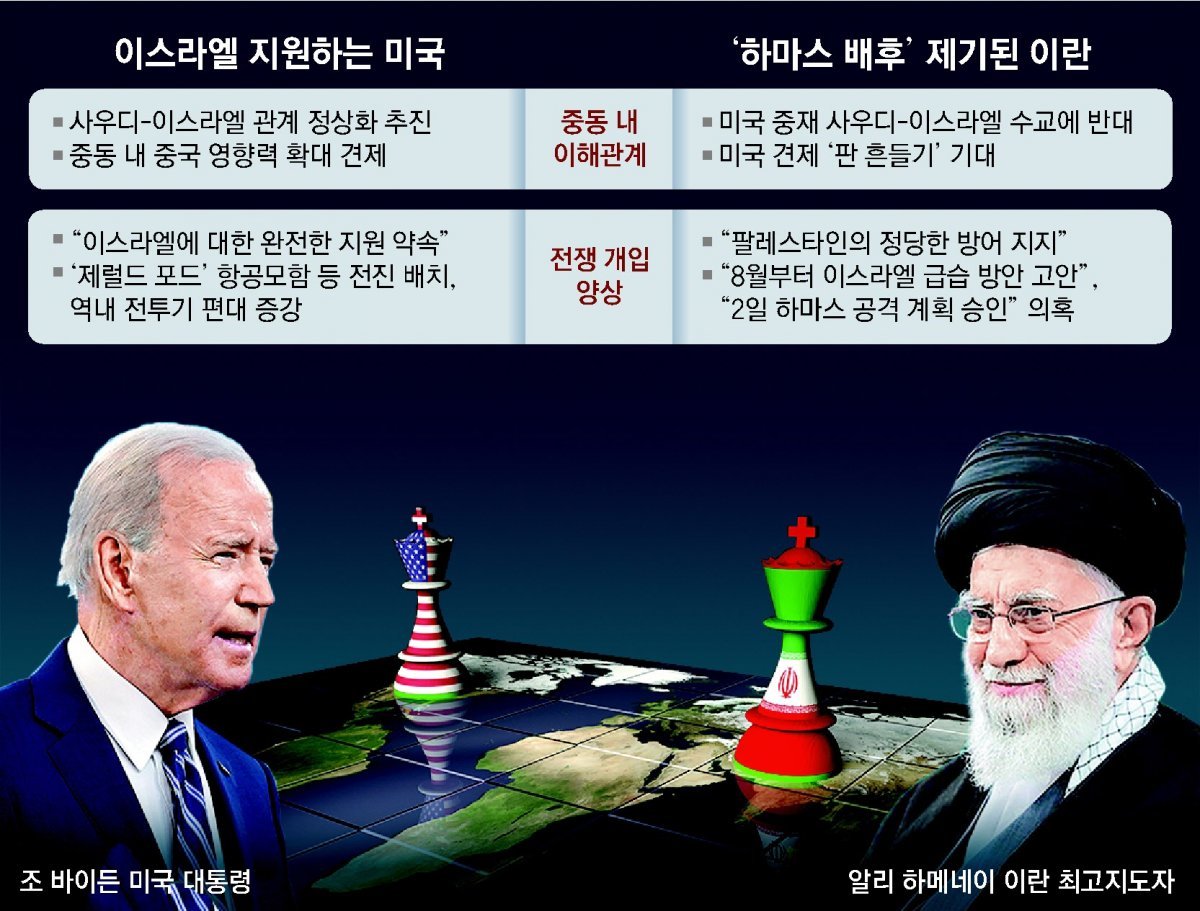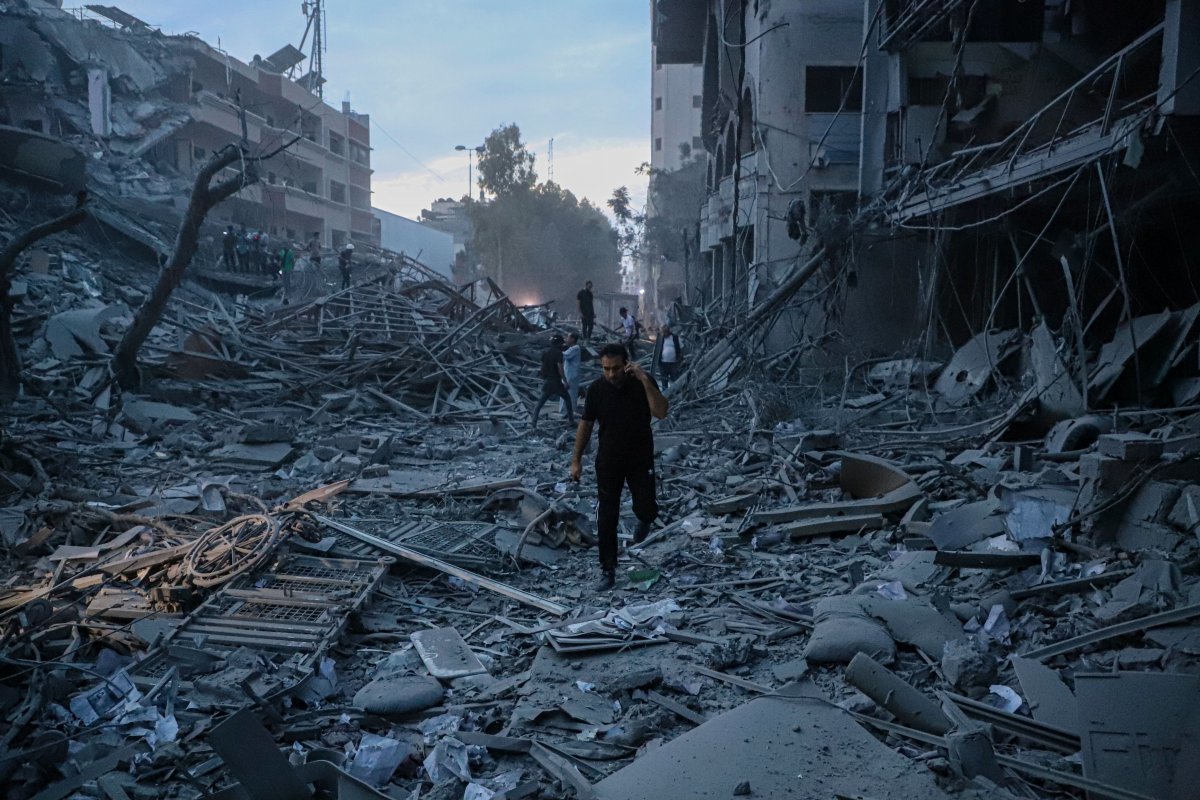Escalation of Israeli-Palestinian conflict
U.S. dispatches aircraft carrier strike group – increases fighter jets
Looks like ground troops will be sent to Gaza
Iran reveals circumstances behind Hamas
The armed conflict between Israel and Palestine, which began with a surprise attack by Hamas, the armed group that rules the Palestinian autonomous region, is spreading into a war shaking the entire Middle East. In particular, the United States dispatched a nuclear-powered aircraft carrier strike group, promising ‘iron defense’ to Israel, with which it signed a security treaty, and suspicions were raised that Iran, which has supported Hamas, approved this attack on Israel, leading to a proxy war between the United States and Iran. The situation is in full swing.
The U.S. Joe Biden administration dispatched an aircraft carrier strike group consisting of the world’s largest aircraft carrier, the Gerald Ford, and five cruisers and destroyers to Israel on the 8th (local time), the second day of Hamas’ surprise attack. In addition, it was decided to increase the number of fighter jets by around 25, including the state-of-the-art F-35 fighter jets. U.S. Secretary of Defense Lloyd Austin said, “The United States maintains a global readiness posture to further strengthen our deterrence posture if necessary.”
There were also speculations that Israel’s deployment of ground troops was imminent in the Gaza Strip, the stronghold of Hamas and where large-scale rocket attacks began. Israel has so far avoided a full-scale ground war because it could result in significant casualties on both Israel and Palestine. It is judged that the deployment of large-scale ground troops has become inevitable, even at the risk of not only causing numerous casualties but also escalating war with neighboring Arab countries.
Circumstances also emerged that Iran was behind the Hamas attack, raising concerns that the war could spread into a ‘river vs. river’ proxy war between the United States and Iran. The US Wall Street Journal (WSJ) reported, citing senior Hamas and Hezbollah officials, that the Iranian Revolutionary Guard (IRGC) approved Hamas’ large-scale attack operation against Israel at a meeting of Iran-backed armed groups held in Beirut, the capital of Lebanon, on the 2nd. The WSJ reported that they have been meeting every other week since August to prepare for this attack.
Iran repeatedly emphasized that it “supports the legitimate defense of Palestine.” Iranian President Ebrahim Raisi targeted both Israel and the United States on the 8th, saying, “The Zionist regime (Israel) and its supporters are responsible for endangering the security of countries in the region.” Iran’s state-run news agency IRNA also reported that President Raisi had previously discussed the situation by phone with the leaders of Hamas and Islamic Jihad, another Palestinian armed group.
Casualties are increasing every day. The number of deaths in both Israel and Palestine was 1,193 as of the 9th, and the New York Times reported that the number of Israeli civilians sacrificed in this war is greater than those sacrificed in the past 20 years. The total number of injured exceeded 5,050.
US-Iran proxy war intensifies
Lee requests weapons from U.S. ahead of ground war
Biden speaks with Netanyahu for second day in a row

There are signs that the armed conflict between Israel and Hamas, the armed group that rules the Palestinian Gaza Strip, is escalating into a proxy war between the United States, which supports Israel, and Iran, which helps Hamas.
Amid speculation that the deployment of ground troops to the Gaza Strip is imminent, Israel began preparing for an all-out war, requesting support from the United States with weapons, including low-altitude air defense system ‘Iron Dome’ interceptor missiles. The United States began providing additional support by dispatching a large aircraft carrier battle group. Although the Iranian government completely denies this, evidence is emerging that it approved the surprise attack by Hamas in advance.
So far, the United States has sought to restore the pro-American camp through ‘Middle East détente (easing tensions)’ such as promoting the normalization of relations between Saudi Arabia and Israel. On the other hand, Iran needed to check the expansion of influence of both Saudi Arabia and the United States, its ‘enemies’ in the Middle East. Concerns are growing that the United States and Iran could use this incident as an opportunity to engage in a proxy war from which they cannot back down.
 Abandoned buildings in Gaza On the 8th (local time), residents of the Gaza Strip, Palestine, are examining the remains of a building devastated by an Israeli airstrike the previous day. As Israel’s retaliatory offensive against the surprise attack by the Palestinian armed group Hamas intensified, more than 120,000 of the 2.3 million residents of the Gaza Strip fled. Gaza Strip = Myth Newsis
Abandoned buildings in Gaza On the 8th (local time), residents of the Gaza Strip, Palestine, are examining the remains of a building devastated by an Israeli airstrike the previous day. As Israel’s retaliatory offensive against the surprise attack by the Palestinian armed group Hamas intensified, more than 120,000 of the 2.3 million residents of the Gaza Strip fled. Gaza Strip = Myth NewsisThe United States announced specific support measures in response to Israel’s request for support as it prepares for an all-out war, including deploying ground troops. The Washington Post (WP) reported on the 8th (local time) that Israel requested support from the United States such as Iron Dome interceptor missiles, Joint Direct Attack Munitions (JDAM) that convert conventional bombs into smart bombs with guidance functions, and machine gun ammunition. .
On this day, the U.S. Joe Biden administration dispatched an aircraft carrier strike group consisting of the Navy’s largest aircraft carrier, the Gerald Ford, five cruisers, and a destroyer, to Israel. It was also decided to send an additional 25 fighter jets, including the state-of-the-art F-35 fighter jet. President Biden, who spoke on the phone with Israeli Prime Minister Benjamin Netanyahu for the second day in a row, ordered additional weapons support after receiving a report from the security team on the situation in Israel, the White House said. The U.S. Congress also discussed an additional weapons support budget worth $100 million (approximately 135 billion won) worth of Presidential Use Authorization (PDA), which President Biden can use without congressional approval.
Meanwhile, the Wall Street Journal (WSJ) reported, citing high-ranking Hamas and Hezbollah officials, that the Iranian Revolutionary Guard (IRGC) approved Hamas’ large-scale attack operation against Israel at a meeting of Iran-backed armed groups held in Beirut, the capital of Lebanon, on the 2nd. . They have been meeting every other week since August to prepare for this attack, and Iran, Hamas, and Hezbollah are aiming to establish a multiple front that can threaten Israel from all directions, the WSJ reported.
Iran supported Hamas’ airstrikes. Iran’s mission to the United Nations denied the allegations in a statement on the 8th, saying, “We are not involved in Palestine’s response, and it was purely done by Palestine on its own.” However, he announced, “It is an entirely legal defense against the oppressive strength and heinous crimes committed by the illegal Zionist regime (Israel) that has continued for 70 years.”
The United States’ rapid military support is interpreted as being intended to prevent Iran or other armed groups from making the misjudgment that they could ‘shake the game’. The Biden administration is concerned that the Middle East détente plan, which it has put a lot of effort into, will be affected by this incident. In this situation, there is a need to clearly demonstrate that we will ‘strongly defend’ Israel, with which we have signed a security treaty.
In particular, as the deployment of Israeli ground troops and Iran’s support for Hamas are revealed, many predict that this Middle East war will be prolonged. If ground troops are deployed to the Gaza Strip, there is a high possibility that the war will last at least several weeks. Meanwhile, the United States’ forward deployment of a large aircraft carrier battle group is a measure to block Iran and other armed groups from supporting Hamas weapons or directly intervening.
On the other hand, Hamas’ decision to conduct this airstrike is interpreted as having an effective strategic goal of preventing the normalization of Saudi-Israeli relations, which has been promoted through US mediation. This is because if the so-called Middle East détente is achieved through reconciliation between Israel and the Sunni Arab world, including Saudi Arabia, the position of Hamas, which has maintained a hardline line of struggle that does not recognize Israel, will be at risk.
This also fits the interests of Iran, which has reacted sensitively, saying that Israel’s close relationship with the Sunni Arab world threatens its security and geopolitical position. This is why suspicions that Iran at least indirectly supported Hamas’ surprise attack have not subsided.
As the international community’s concerns about the escalation of war grow, the UN Security Council convened an emergency ‘informal consultation’ on the 8th to discuss this situation. Ahead of the Security Council consultation, the Israeli Ambassador to the United Nations and the Palestinian Authority Ambassador volunteered to hold a press conference to debate public opinion. Israeli Ambassador to the United Nations Gilad Erdan emphasized, “This attack is Israel’s version of 9/11.” On the other hand, Riyad Mansour, Ambassador of the Palestinian Authority to the United Nations, responded, “It is time to stop the bloodshed and lift the blockade.”
Cairo =
Washington =
Source: Donga
Mark Jones is a world traveler and journalist for News Rebeat. With a curious mind and a love of adventure, Mark brings a unique perspective to the latest global events and provides in-depth and thought-provoking coverage of the world at large.